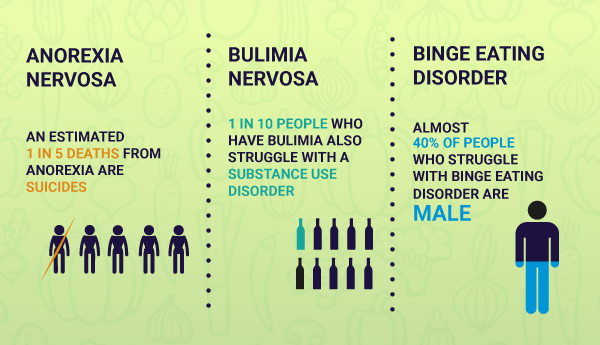Eating Disorder Recovery for Beginners
Wiki Article
The Of Eating Disorder Recovery
Table of ContentsFascination About Eating Disorder RecoveryThe 6-Second Trick For Eating Disorder RecoveryGetting The Eating Disorder Recovery To WorkIndicators on Eating Disorder Recovery You Need To KnowExamine This Report on Eating Disorder Recovery

Orthorexia is a type of eating condition, still unacknowledged in the DSM, wherein a person ends up being consumed with "healthy eating." While many individuals emphasize to be knowledgeable about the ingredients and also sourcing of their food, orthorexia can become damaging to the person's health and wellness. Orthorexia creates people to determine details food or food groups as "proper," "healthy and balanced," or "pure." At some point, specific foods or entire groups are gotten rid of from the individual's diet plan; they might additionally start to obsess over the components in their foods, investing hours each day preparation dishes (eating disorder recovery).
Food active ingredients may additionally become the individual's only topic of discussion. Wellness effects could include a selection of intestinal and nutritional inequalities. It can likewise create most of the very same health threats as anorexia nervosa, as the individual's calorie consumption may be significantly limited. Orthorexia is additionally a typical co-occurring condition connected with OCD.
Not known Facts About Eating Disorder Recovery
With this disorder, a person will purely avoid certain foods to the detriment of their health and wellness - eating disorder recovery. Unlike orthorexia, nevertheless, the evasion of certain foods isn't driven by ideas of the food's healthfulness or pureness, but rather by a severe hostility to the food's flavor, structure, or odor (although worries concerning spoilage or food poisoning may also exist).With time, an increasing number of foods come to be illogical, bring about an extremely minimal scheme of appropriate foods. Previously called careful eating disorder, ARFID frequently begins in childhood as well as gradually aggravates gradually. It's relatively usual for children to be "particular eaters" as well as every person has preferences for what they eat, however if it becomes compulsive and also detrimental to a person's health and wellness, it necessitates a check-in with an eating problem therapy expert.
Like orthorexia, an unfavorable or distorted body photo is not necessarily a reason of the disorder. ARFID is usually dealt with utilizing talk treatment and cognitive retraining such as Cognitive Behavior Modification (CBT). Unlike many eating disorders which typically initially existing throughout teenage years, rumination disorder is most typical in infancy and also early childhood years, although it can persist into the adult years.
The Basic Principles Of Eating Disorder Recovery
Generally, they do not experience stress or disgust when throwing up, nor do they appear to make an effort to vomit (as seen in bulimia nervosa). Rumination problem is often a reaction to an irrational anxiety of health problem caused by eating, although its causes are less well-understood than other eating problems.

While lots of people make a factor to be aware of the ingredients as well as sourcing of their food, orthorexia can end up being harmful to the person's health. Ultimately, specific foods or entire teams are removed from the person's diet regimen; they may also start to stress next over the active ingredients in their foods, investing hours each day preparation meals.
The Facts About Eating Disorder Recovery Revealed

With this problem, an individual will purely avoid specific foods to the hinderance of their health. Unlike orthorexia, however, the avoidance of particular foods isn't driven by notions of the food's healthiness or pureness, however instead by a severe aversion to the food's flavor, appearance, or odor (although worries concerning wasting or food poisoning might also be present).
Over time, a growing number of foods come to be illogical, causing an incredibly restricted scheme of acceptable foods. Formerly referred to as discerning eating disorder, ARFID typically starts in childhood as well as gradually gets worse with time. It's fairly typical for kids to be "fussy eaters" and everyone has preferences wherefore they eat, however if it ends up being uncontrollable and also damaging to an individual's health, it warrants a check-in with an eating disorder treatment specialist.
Some Known Questions About Eating Disorder Recovery.
Like orthorexia, a negative or altered body photo is not necessarily a reason of the problem. ARFID is normally dealt with making use browse this site of talk therapy and cognitive re-training such as Cognitive Behavior Modification (CBT). Unlike most eating conditions which typically first existing during adolescence, rumination condition is most common in early stage as well as very early childhood years, although it can linger right into their adult years.Generally, they do not experience anxiety or disgust when throwing up, neither do they show up to make an initiative to throw up (as seen in bulimia nervosa). Rumination disorder is usually a response to an illogical anxiety of disease brought on by eating, although its causes are much less well-understood than other eating conditions.
Rumination condition is detailed in the DSM-V. Diabulimia is detailed as one of the lots of undefined eating conditions under the catchall term OSFED (Various other Specified Feeding r Eating Problem).
Report this wiki page